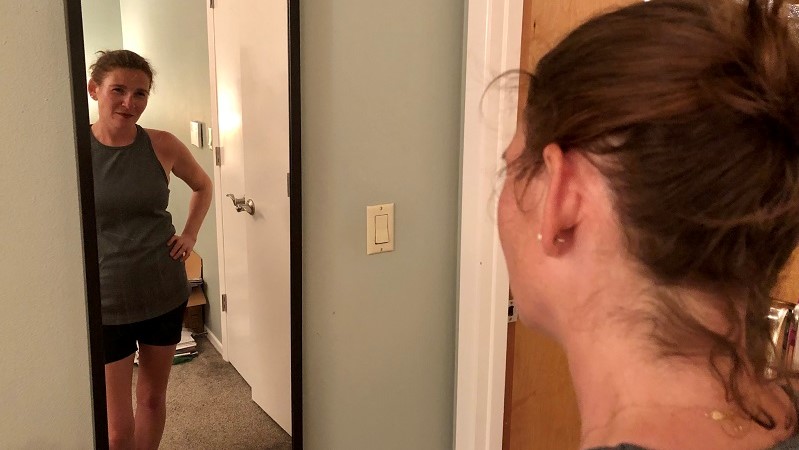I struggle with body dysmorphia. It isn’t something I talk about often, and this is probably the first time I’ve shared it so very publicly. I’m not exactly sure how I got to this point, but when I look at my physical self, I see my flaws instead of my strengths. What’s even more frustrating than this disconnect is the fact that I’m aware of it. I know the way my eyes view my body is a distortion of the reality of what others see. It’s like I’m at war with myself. My body birthed two incredible babies, and my legs carry me an average of 130 miles a week; yet, there are days when I look in the mirror and can’t see past my own perceived flaws instead of the strengths that I know are there.

If you know someone who struggles with body dysmorphic disorder, you know there’s no “cure” or any way to talk them out of it. It’s an uphill battle no matter how much you praise their strength or beauty or how much you gently try to remind them that the issue is mental and not physical. When I get stuck in these moments, the thing that helps most is going back to a list I’ve made for myself of things I love about me. It’s not just physical things, but things that make up my entire being. This is usually the most reliable way to help me become “unstuck” from that destructive thinking mode.
While not all of us might have to deal with body dysmorphia, we all go through moments of doubt. Each of us is likely to experience times when we let negative feelings creep in. Our Torah portion this week reminds us that while being in a self-doubt rut isn’t helpful, there’s power in reframing our reality.
This week we read Parshat Shlach Lecha and the story of the spies. The parshah begins with Moshe sending 12 spies, one from each tribe, into the land of Cana’an to bring back an accounting of the land. The spies return with their report, and it’s pretty discouraging. Two spies report back with a positive message, but the negativity of the other ten reports instills so much fear into the nation that they decide they do not want to make the journey into the promised land after all. This infuriates God, who then decrees that anyone who went out from Egypt at age 20 or older will not be allowed to enter the land of Cana’an. This generation will purposefully die out so that a new generation, unfettered by the destructive mindset of their predecessors, can start anew.
At the end of chapter 13, the spies come back and share their story. They use a lot of negative language when they compare themselves to the Canaanites. They use phrases like “we cannot rise up” and “it is stronger than we” and “we looked like grasshoppers to ourselves.” Each statement is another way of saying “We’re not good enough, we are unable, unworthy, weak.” It’s not based in reality, as we find out, but in their perceptions. The Israelites lose sight of the fact that not only is God with them, but they have already overcome so many battles and struggles.
Somehow, the Israelites cannot imagine that others would see them as strong, brave, worthy or powerful. Instead of taking stock of how awesome and incredible they are, they’re comparing how they measure up to others. This toxic outlook spread beyond the spies to the entire nation, and it would have been the single viewpoint, were it not for Joshua and Caleb and their perspective. It wasn’t merely a different accounting of the land. Joshua and Caleb reminded the Israelites of God’s power and of their own strength, and they fought to push the other, more negative narrative aside.
Like Joshua and Caleb reminding the Israelites how strong and courageous they are, Parshat Shlach Lecha is a reminder to us all that our perspectives of ourselves are sometimes so skewed that they leave reality in the dust. As we start to reopen our communities and see each other more often face to face, let’s remember that the version of someone you’re seeing might not be the version of themselves they saw for the last 15 months. Instead, let’s promise to recognize and reconnect with each other’s inner beauty and strength. That is truly how we’ll lift one another up.
– Rabbi Eve Posen
Source: If You Could See You Like I See You – Parshat Shlach Lecha 5781



